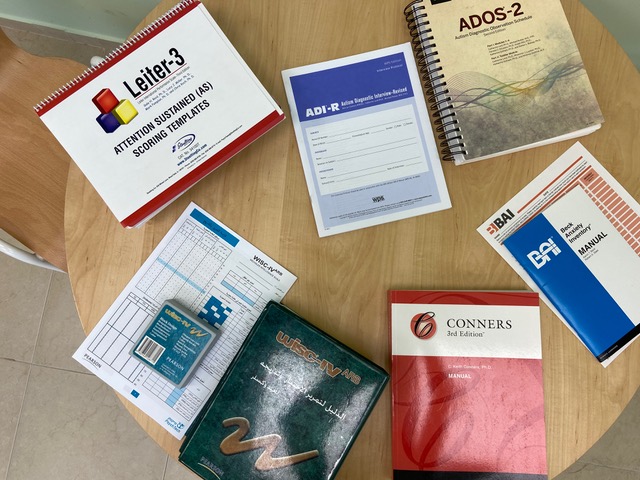Diagnostic Assessment

In Takween, we use internationally standardized assessments. Our team have the necessary knowledge and expertise to use each assessment according to their specialty.
They are as follows:
Preliminary Assessments (Screening):
- Portage-1: This assessment is applied to children aged 0-9 years, providing results that compare chronological age with the child's developmental age.
- Vineland Adaptive Behavior Scale: Applied during the first visit for children over 9 years, it offers a detailed comparison between chronological age and developmental age.
Clinical Psychology Assessments:
- WISC-IV (Wechsler Intelligence Scale for Children): Derives the child's general intelligence scores (ages 6-17) for interventional planning.
- WPPSI-III (Wechsler Preschool and Primary Scale of Intelligence): Identifies early cognitive abilities and general intelligence in children aged 2.5-7 years.
- Leiter-3 Intelligence Test: For non-verbal children aged 3 and above.
- ADI-R (Autism Diagnostic Interview-Revised): Initial interview with parents to diagnose autism spectrum disorders in children aged two and above.
- ADOS-2 (Autism Diagnostic Observation Schedule): international assessment for diagnosing autism after the age of one year.
- Conners-3: Used for diagnosing behavioral disorders, ADHD in children aged 6-18 years.
7- Children Depression Inventory (CDI): Ages 6-17. - Achenbach: For diagnosing behavioral disorders and sleep problems in children aged 2-5 years.
- Beck Anxiety Inventory (BAI): For diagnosing anxiety.
- Traumatic Stress Diagnostic Scale: Post-traumatic stress assessment.
Speech and Language Therapy Assessments:
- PLS-5 (Preschool Language Scale-5): Applied to children aged 1.5-7 years to assess
expressive and receptive language skills. - CELF-2 (Clinical Evaluation of Language Fundamentals - Preschool): Applied to children aged 8-5 years to assess language skills.
- CELF-4: Applied to children aged 5-18 years for advanced language skills in expression, comprehension, and communication.
- Amirah Articulation Test: Examines speech disorders and articulation.
- SSI3 (Stuttering Severity Instrument): Assesses stuttering and associated secondary behaviors.
- Jaw Assessment (Talk Tools): Evaluates the performance of speech muscles and organs (mouth, tongue, jaw, lips).
Physiotherapy Assessments:
- GMFM (Gross Motor Function Measure) Assessment: Evaluates motor skills in children with delayed motor development.
- Tinetti Balance Assessment: Diagnoses motor balance problems in children.
Occupational Therapy and Sensory Integration Assessments:
- Sensory Profile Assessment: Applied to children aged 1-14 years to diagnose behavioral problems resulting from specific sensory influences, especially in autistic children.
- Portage-2: Assesses fine motor skills in children.
Special Education Assessments:
- Princess Tharwat Test: Comprehensive assessment of learning difficulties in children from various aspects such as auditory sequential memory, auditory memory capacity, auditory analysis skill, visual analysis, visual-motor integration, and other aspects related to the child's learning ability.
- ABLLS (Assessment of Basic Language and Learning Skills): Tool for assessing basic learning and language skills in children, with a guiding curriculum indicating the child's capabilities and how to enhance and develop them.
